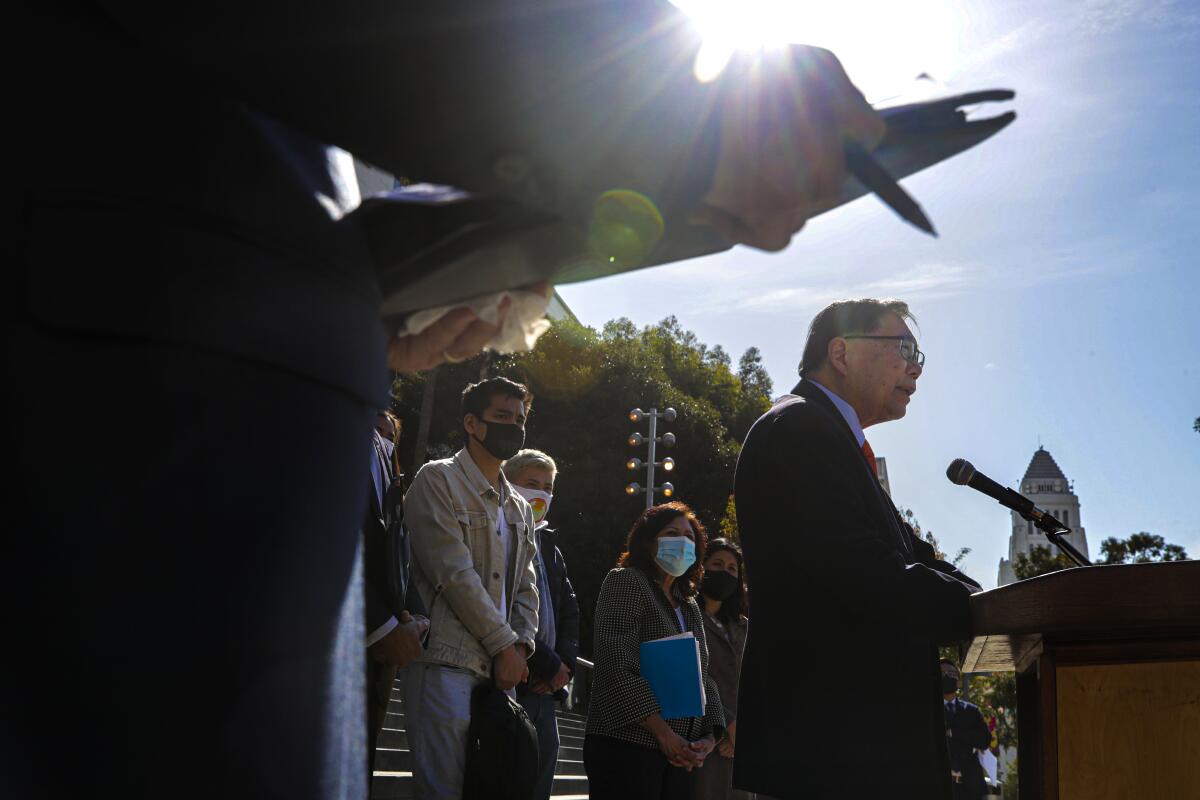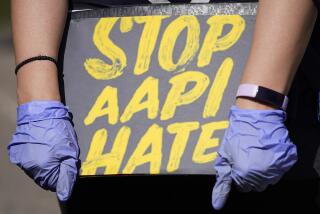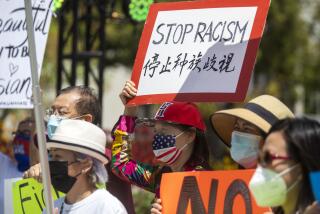Violence has Asian Americans questioning how far they have really come in their American journey

- Share via
Phil Yu was not surprised that a white gunman killed eight people, six of them Asian women, at Atlanta-area spas advertising their “Asian” or “international” staff.
The worst thought he had on Wednesday, the day after the massacre, was just that, he said — he had seen it coming.
“Being Asian in this country, no matter how long you’ve been here or how you got here, often feels like a constant negotiation of feeling unwelcome,” said Yu, a blogger and commentator in Southern California who posts as Angry Asian Man.
Many Asian Americans are bristling with pain and fury, seeing the killings as a culmination of a steady drumbeat of racist attacks, with some people blaming them for the coronavirus pandemic because of its origins in China.
Law enforcement officials said that Robert Aaron Long, a 21-year-old from Woodstock, Ga., was motivated by “sex addiction,” that there probably wasn’t a racial component to the attacks and that Tuesday was “a bad day for him.”
Long was charged Wednesday with eight counts of murder and one count of aggravated assault.
But many Asian Americans saw it differently. The killing of so many Asian women, at businesses known to employ Asian workers, was a racial targeting by its very circumstances, they said.
They feared for their parents, their grandparents, their friends, their children, themselves. They lamented that hard-won immigrant dreams had been tarnished by hate. Some Asian American women shared their experiences of being dehumanized and fetishized by white men.
After all, the killings happened the same week the advocacy group Stop AAPI Hate reported that thousands of Asian Americans and Pacific Islanders have faced racist verbal and physical assaults since the pandemic began more than a year ago.
Also this week, former President Trump again called COVID-19 “the China virus” on national television.
Rep. Judy Chu (D-Monterey Park) is set to testify at a congressional hearing Thursday on the rise in hate crimes against people of Asian descent.
Chu, the first Chinese American woman elected to Congress, chairs the Congressional Asian Pacific American Caucus.
She laid the eight deaths directly at Trump’s feet, as did some other Asian Americans.
“President Trump clearly stoked the flames of xenophobia against AAPIs with his rhetoric,” Chu said Wednesday on Capitol Hill during the Democratic Caucus’ weekly press conference, by calling the virus “kung flu” and the “Wuhan virus,” in addition to the “China virus.”
“And what we saw yesterday is the result of that,” she said.

At least four of the women killed were of Korean descent, and the attacks have been closely covered in Korean-language media.
At the Korean supermarket H Mart in Garden Grove, some shoppers debated the suspect’s motives.
Some wondered why there hasn’t been more focus on the shooter’s “racial targets.”
When asked for their thoughts on the violence, several older shoppers turned away.
“We don’t want to be targets, too,” one said.
At neighboring businesses, people dashed in and out for quick haircuts and steamed tofu lunches.
Elizabeth Choi was choosing a birthday cake for her uncle at the Paris Baguette bakery.
The occasional mention of anti-Asian hate incidents within her inner circle seemed “just like casual talk, until we heard about what the guy did to the spa workers,” said Choi, who is Korean American.
“Why would people want to harm poor workers? Something more aggressive seems to be happening — yes, we’re scared now,” she said through an interpreter. “Really scared. Terrified.”
The Brea homemaker, 51, said her daughter advised her not to go to “too many areas outside of Asian areas.”
“When they’re looking for a Chinese face” to blame the pandemic on, “any Asian face” will do, Choi’s daughter told her.
At the beginning of 2020, when news of the coronavirus was circulating in Asia and Europe but not yet in the United States, Christine Liwag Dixon braced herself for what was to come.
Dixon is mixed-race Filipina and white, a 31-year-old writer who lives in New York City. Family members and friends had shared some of the racist comments about Asians they had endured even in the very early days of the pandemic.
“I was afraid to leave the house,” she said.
When she finally ventured out once last year for a neighborhood walk, she wondered: “What if they say something? What if they throw something at me?”
As Dixon watched the news of the Atlanta attacks and learned about the increase in anti-Asian hate crimes in New York, she cried.
All those times, she realized, she wasn’t overreacting. When officials said the shootings weren’t racially motivated, she laughed in disbelief.
“I think that’s a load of bull—” she said.
Dixon and other Asian Americans are frustrated and angry that there had not been more attention on the issue.
“I have felt almost gaslit by the lack of coverage,” she said. “I’ve been sitting here all day wondering, ‘Why now? Why today?’ We’ve been talking about this for a year. Why does it take these Asian women being slaughtered for people to suddenly pay attention?”
Social media was charged with such outrage Wednesday.
“In less than 48 hours, we had a historic Asian Oscar moment with multiple firsts in 93 years—then a mass shooting targeting 3 Asian-owned businesses. This is how terrorism works—you’re not allowed to feel safe, accepted, or valued. We can resist. Take up space. Make noise,” tweeted novelist Min Jin Lee.
“Instead of centering a White Supremacist who had a ‘sex addiction’ (which btw you can also be a racist terrorist simultaneously), remember the real victims yesterday and their families,” Los Angeles comedian Kristina Wong said in a tweet.
And Rep. Ted Lieu’s tweets got angrier as the day went on.
At 8:27 a.m., the Torrance Democrat targeted Trump and some elected officials for creating a hostile environment with hateful anti-Asian rhetoric.
“If you are one of those officials,” he wrote, “please stop.”
At 9:55 a.m., he scoffed at reports that “sex addiction” rather than racism motivated the shooting suspect.
Two and a half hours later, he sounded like he’d had enough, after a spokesman for the sheriff’s department in Cherokee County, Ga., said the alleged gunman went on a rampage because “yesterday was a really bad day for him.”
“All of us have experienced bad days,” Lieu tweeted. “But we don’t go to three Asian businesses and shoot up Asian employees.”
The former prosecutor said in an interview that denying a racial component to the shootings “does not comport with the facts as we know them right now.”
“We’ve seen an increasing amount of violence toward Asian Americans, beginning with more verbal harassment,” Lieu said. “Then it escalated. You had an Asian American family in Texas last year that was stabbed, because the perpetrator thought they had spread the virus … Then you saw elderly Asian Americans targeted. For many of us, it was not surprising to see multiple Asian victims of the crime.”
And then there’s history, a reminder that what’s past is prologue, from the 19th century “yellow peril” scapegoating and Chinese Exclusion Act to the incarceration of Japanese Americans by the U.S. government during World War II.
In 1982, a 27-year-old Chinese American man named Vincent Chin was beaten to death with a baseball bat by two unemployed Detroit autoworkers who thought he was Japanese.
It was a time when the U.S. auto industry was in decline. The attackers blamed Chin.
“When Americans feared Japan’s rise in the 1980s, that caused an increase in hate crimes,” Lieu said. “And now, with the pandemic, you see a rise in hate crimes against Asian Americans. … When America felt threatened in the past, sometimes this country would target Asians.”
Times staff writers Jenny Jarvie, Emily Alpert Reyes, Don Lee and Victoria Kim contributed to this report.
More to Read
Sign up for Essential California
The most important California stories and recommendations in your inbox every morning.
You may occasionally receive promotional content from the Los Angeles Times.












